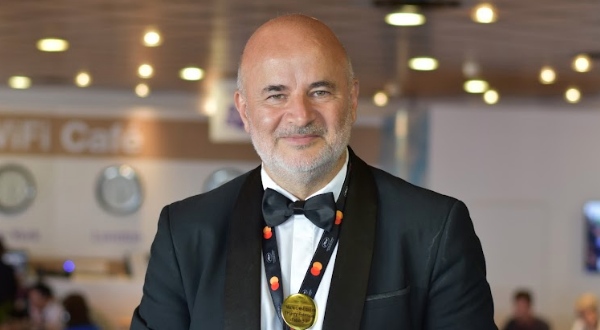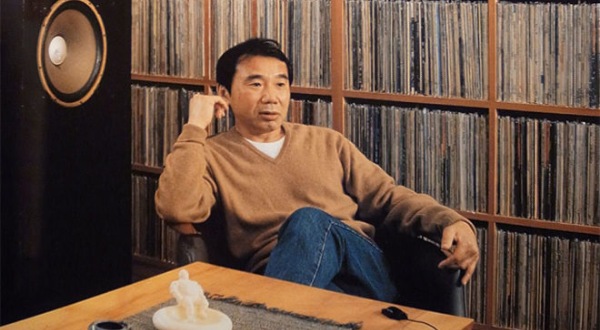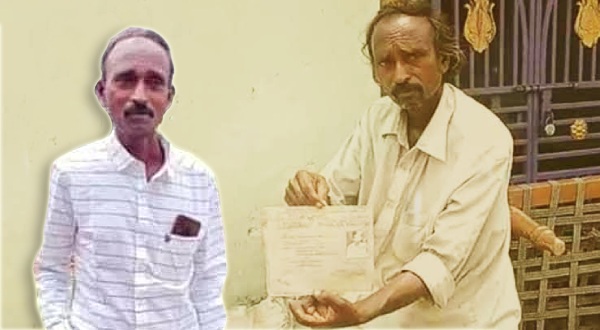The interview took place on 28.05.2022 at the press-cafe in Palais des Festival, Cannes. Ammar, a Syria born freelance photographer, has been covering Cannes’ red carpet for the last 15 years. This year he represented a well-known cinema magazine from Lebanon. I had, to be precise, stalked him for days through the festival. I had secretly watched him edit Tom Cruise’s photo which went viral through social media during the festival days. Finally, he gave in on the 28th. I have kept his words, dialect, and sentences as intact as possible.
Rupak: Is photography your profession?
Ammar: Off-course! I mainly do press photography.
Rupak: Entertainment?
আরও পড়ুন
We did not have the choice of being political or apolitical : Maksym Nakonechnyi
Ammar: Not necessarily. I do serious news, politics, war almost everything; so that I am not bored you know (smiles). Recently I covered the French President in Paris.
আরও পড়ুন
Cannes-এর দরজা ঠেলে: যে কথা বলা হল না
I have worked in Syria, Iraq and even Libya during the 2011 uprising. I can’t forget a particular week from 2013. That week, I shot in Aleppo (Syria) on Monday. On Tuesday I worked for the whole day in Gaziantep (Turkey). The same evening, I took a flight through Istanbul and Paris and next day morning I was ready with my badge, tuxedo and camera on Cannes’ red carpet (Laughs)!
আরও পড়ুন
Cannes-এর দরজা ঠেলে: ‘বয় ফ্রম হেভেন’ এবং এক ন্যারেটিভের কিংবদন্তি হয়ে ওঠার গল্প
Rupak: Amazing! How long have you been in this profession?
Ammar: 31 years, and on the red carpet for 15 years. I came for the first time exactly 20 years ago; in 2002. In the first few years I used to do small assignments in hotels, parties etc; and later got the credentials for covering the carpet steps which gives you very-very hectic yet interesting days (laughs)!
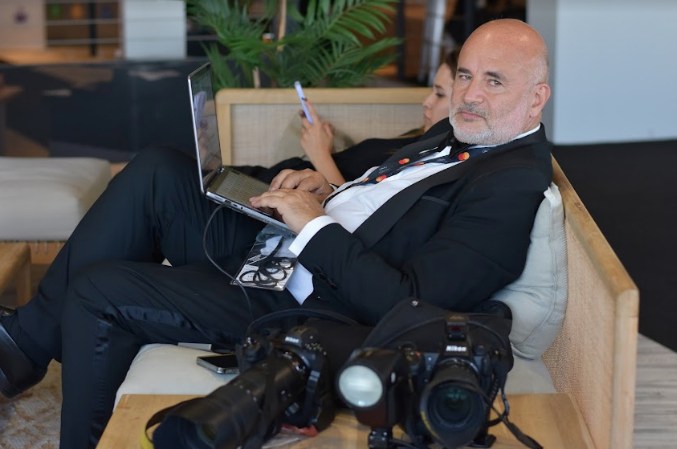
Rupak: Yes, I can completely understand.
Ammar: But it is good, it is fun, it’s quite enjoyable! It gives you unlimited access to world famous celebrities. It is safer than working on politics, war or things like that. Here the biggest misery for someone could be a wardrobe malfunction! So, nobody dies you know, and it’s fine! (Laughs heartily)
Rupak: I have a couple of questions for you. Firstly, as you said, you have been coming to Cannes for 20 years. What do you think has changed over the years for photographers of the festival?
Ammar: Well, I would say the core has remained same. The festival is very good for photographers and the committee gives a lot of priority and advantages to us.
But I should say that in 15 years the biggest difference has been created by the arrival of smart mobile telephones. This has completely changed the relation between human and photographs.
The festival committee understands this problem. They have banned mobile telephones and selfies in the red-carpet area. I see this as a kind gesture as it helps the value of our work.
One more thing is important; with new technologies and social media the relation between people and celebrities have changed too. In my early days (2002) you could still come across big celebrities like actors, actresses, directors on the street or in cafes. Now it is impossible!
Rupak: Why do you think so?
Ammar: I mean, now a days, as soon as they come out people will start using their phones and their privacy will be destroyed! Because of this, jobs and profiles like advisors or press attaché have gained importance and power. They dictate the celebrities on where to go, what to do etc so that they remain safe. I think this is also an important change.
I will say, I myself have arrived a bit late, you know. My seniors and colleagues from the 80’s used to bump into celebrities quite often. I have heard from one of my seniors that he once had the chance of accidentally meeting Robert de Niro in a restaurant. And not only so! They also had dinner together and fought on certain topics too. (smiles) They used to be real people in those days, now these celebrities are icons whom you can see on the screen or after the premiere.
Rupak: So are you saying that the obsession with mobile telephone cameras have created this wall?
Ammar: Well, I would say that the timing matches you know! (laughs)
Rupak: Do you have any personal memory of such encounters?
Ammar: (smiles) I do remember meeting a few French celebrities. You see we have access to their hotel lobbies. I have a fond memory of chatting with Julie Gayet in such a lobby. Nothing with the Americans though!
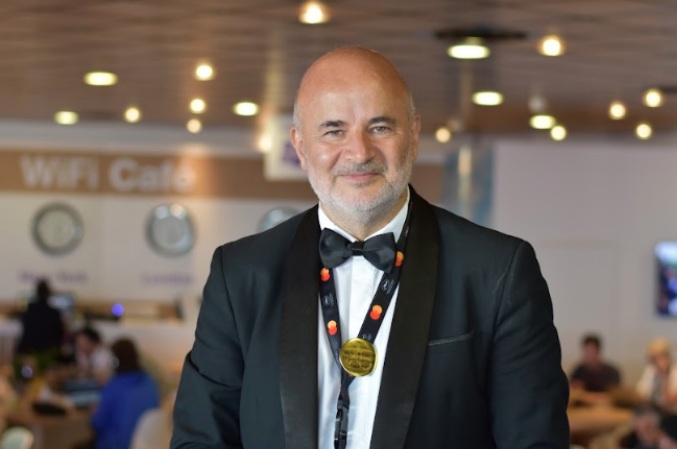
Rupak: Wow! Let me ask you a different question. What do you think is the biggest challenge for a professional photographer in this post covid world?
Ammar: The main challenge to get people pay for photos, you know! As I said to you before, everyone is taking photos with their phone now a days. Magazine editors used to buy pictures from us, but now they can have them for free from time to time. Let’s say a movie publicist sends them pictures on what’s happening in Cannes; or people in the streets with cameras and good lenses are greedy over short term fun-recognition. So, these sources of free images are a pain for us. And off course, many publications have run out of funding in this post covid period. So, they are preferring free photos too.
To summarize I would say the biggest challenge is to make people consider our job as a job; that, this is a job that needs to be paid! Many people say, oh it is only a photo, you can give them to us for free! Where will we go?
The second challenge is to get good pictures! You need to have strong network in this field. I mean red carpet photos are good, but everybody is doing them.
Rupak: How do you overcome this challenge?
Ammar: You need to find something more, may be in hotels, may be somewhere else. You need to use your PR skills and connections that you have been building for years, let’s say with producers, publicists, press attaches and people like these. Someone could give you a tip saying Mr. X is in this beach, he is ready to pose, and you have a 10-minute window.
So, you need to find ways of getting pictures that have value, that have a meaning and that other people don’t have. For instance, I am from the middle east, I know celebrities, actors, directors from that area quite well. A similar professional from South America will probably know celebrities from his region better. This is how it works.
And finally, you also need to have a good network to sell these images. You must be flexible; it is not the same world anymore. For instance, my daughter takes great photos with her phone, and she asks me where am I different? I say to her that I am flexible, I am fast, I can travel, I am good- Try Me! (laughs)
Rupak: Thanks a lot for your candid answers. Do you have anything to say to our readers?
Ammar: Let me tell you one last thing about the festival.
Cannes is very much related to photos. If you go to the red-carpet area, you will see that photographers have their position numbers (shows his badge with number 42), and professionals from USA, France, Middle East, India etc. are fighting and shouting over one good shot! Oscar is important too, but that’s only about one night! This is a festival of twelve nights! If someday the festival committee decides to ban photography for some reason, Cannes will not remain the same.
If there are no photos…there is no Cannes…
Powered by Froala Editor
